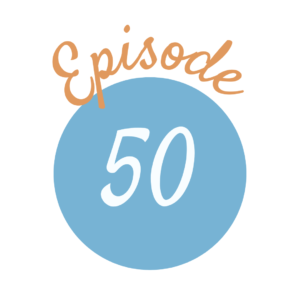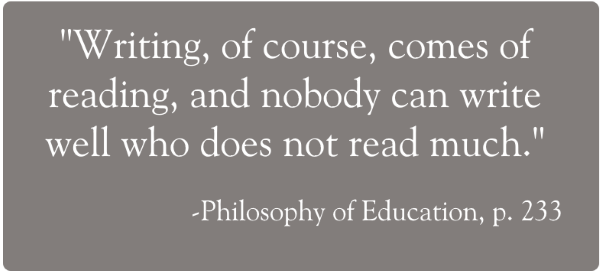
What are Charlotte Mason’s thoughts on grammar and composition? Listen to this podcast to hear some of her rationale for these subjects, to dispel myths about the Charlotte Mason method and the subject of writing, as well as these moms’ experience with teaching these technical and creative written skills.
Listen Now:
“[G]rammar, being a study of words and not things, is by no means attractive to the child, nor should he be hurried into it.” (Vol. 1, p. 295)
“Children will probably be slow to receive this first lesson in abstract knowledge, and we must remember that knowledge in this sort is difficult and uncongenial. Their minds deal with the concrete and they have the singular faculty of being able to make concrete images out of the merest gossamer of a fairy tale.” (Vol. 6, p. 210)
“But a child cannot dream parts of speech, and any grown-up twaddle attempting to personify such abstractions offends a small person who with all his love of play and nonsense has a serious mind.” (Vol. 6, p. 210)
“Our business is to provide children with material in thier lessons, and leave the handling of such material to themselves…They should narrate in the first place, and they will compose, later, readily enough; but they should not be taught ‘composition.'” (Vol. 1, p. 247)
“It is not enough that a child should learn how to write, he must know what to write.” (Vol. 6, p. 234)
“In fact, lessons on ‘composition’ should follow the model of that famous essay on “Snakes in Ireland”––”There are none.”” (Vol. 1, p. 247)
“If we would believe it, composition is as natural as jumping and running to children who have been allowed due use of books.” (Vol. 1, p. 247)
If you would like to study along with us, here are some passages from The Home Education Series and other Parent’s Review articles that would be helpful for this episode’s topic. You may also read the series online here, or get the free Kindle version from Fisher Academy.
Home Education (Volume 1), Part V, XIII
An Essay Towards a Philosophy of Education (Volume 6), Book I, Chapter 10, Section II: Knowledge of Man: Composition & Knowledge of Man: Grammar
(Contains affiliate links)





This was so helpful! I do have to say that I was one of those weird (apparently) kids that LOVED diagramming sentences. *sigh* I've also read lots of books about grammar because I find it fascinating and funny! (Eats, Shoots and Leaves, anyone?)
Anyway, I appreciated that Emily mentioned that there are some (a few?) kids who love and appreciate grammar, and not letting them find that out would be terrible! HA!
Lots and lots of good stuff here, Ladies! Thank you, as always!
(Now I'm worried that my grammar isn't perfect in this comment! LOL)
I've been waiting for this episode ever since you mentioned you would be covering grammar and composition, thank you ladies it was (as always) very helpful!!!
I had a quick question regarding frequency and scheduling. How frequently should I be having my form 2 and 3 students be doing written narrations?
If I'm understanding correctly I would schedule a weekly 30 minutes "writing" slot for my form 3 child for her to write about something she knows from her reading, AND she should be doing written narrations (in addition to continuing on with oral narrations.)
Thank you for another interesting and informative episode! Do you have any recommendations for grammar curriculum that are laid out according to CM's method, beginning with teaching the parts of a sentence prior to the parts of speech, and include sentence diagramming? Also, I was wondering if you have any thoughts on progymn-type narrations (such as narrations that are intentionally condensed or amplified, or told from the point of view of different characters, etc) and if this fits well with CM's methods or hinders them. Thank you!
just, thank you…i was pondering some of these very things today. I was very encouraged and emboldened! Sometimes I need to be reminded to stay the course
This was so helpful ladies! I really loved some of your ideas for getting a reluctant or beginning written narrator flowing in that area, Liz.
I really loved some of your ideas for getting a reluctant or beginning written narrator flowing in that area, Liz.
Catie,
I also thoroughly enjoy grammar–its quirks and beauties. I'm glad the episode provided plenty of food for thought.
-Liz
I have a question about spelling in written narrations. I know it is important for the child not to see incorrect spelling, so how do you address this when the child has just begun written narrations? Do you correct anything in their written narrations or is it something you just let slide until they are more accustomed to the act of transferring their thoughts onto paper?
Thank you for all your wonderful thoughts! It is so helpful and encouraging!
I wanted to add, I remember you guys talking about how they will be very basic and maybe a bunch of sentences strung together with "and", but I couldn't remember if you mentioned spelling or other corrections? I am sorry if I missed it in the podcast. I might not have been paying full attention because I was doing dishes also
I loved this episode! I teach a high school writing class at a once-weekly homeschool co-op. The school has us using the IEW curriculum, for which which I have mixed feelings. One the one hand, it's easy to teach and I feel the grading rubric gives the students an idea what is expected of them. I've seen students come to understand writing mechanics through the IEW method. But, on the other hand, some creativity is lost in the formula. Since I have only limited contact with my students (I'm not with them every day to read to and with them for years leading up to our class), is this the best curriculum out there? I have told parents their students should take other types of writing or reading classes in high school along with my IEW class. Our co op offers Reader's Theatre, Creative Writing, World Lit, and other similar classes.
Thank you so much for breaking down all of CM's ideas into practical workable bites for us. I am just wondering if there is any general pattern of how many written narrations should be required based on the age the of student?
Heather,
How often you do written narrations may have to do with your child's ability with oral narration, as well as writing in general. I usually recommend a beginner do one per week, again, within the lesson time and after the reading (noting you may have to leave a little more time for writing than oral narration, and thus, lessen the amount of reading pages). By form 3 I would think a child should work up to being able to do a written narration on any subject. By the end of the first year, at least one per day would be good for a form 2 student.
-Liz
We are happy to share and are glad it is helpful to you.
-Liz
You are right on both counts–children should not see misspelled words and you should not correct narrations. Most children do not reread their narrations; it is the work of writing them that is the learning for them of the ideas and knowledge in their reading. I sometimes keep a list of frequently misspelled words found in my child's writing and make sure our dictation selections include those, or use those words in grammar exercises. Time will make a difference and just remember that there is no problem in showing a child a correctly spelled word at another time apart from the written narration subject to show him how he should spell it. It is most important for the child to get his thoughts out, however, and let spelling improve through other avenues.
-Liz
Diana,
I appreciate your diligence to help young people write. I am confident Mason would not use a program like that–considered writing instructions as unnecessary, like "snakes in Ireland." A narrating child knows how to write and only needs practice–as I'm sure we said on the podcast, perhaps minimal suggestion about style and mechanics. We must not underestimate the intellectual powers of the child.
-Liz
Regarding your second question, if you are referring to written narrations being left uncorrected for grammatical and spelling errors, that is the procedure. These errors you notice can be corrected in other ways–especially by continuing to have good literature before their eyes.
And, I'm so glad to hear the dishes get done in addition to school.
-Liz
Liz,
You mentioned Strunk & White as a possibility for teaching grammar. Are you able to flesh out any specifics on what this could look like? I notice it doesn't start at the very basics of parts of speech so am wondering how to teach those. Thoughts?
Thank you!
Strunk and White is a concise writing guide and contains the most basic grammar and punctuation rules in the first portion. As a grammar, it is helpful to know those rules. As far as parts of speech, it assumes you know them. Usually, by high school, when a student might use this book to polish and enhance their composition, the basic parts of a sentence are familiar. Mason began with the study of sentences before dissecting them into components. Any reputable grammar handbook can inform you of the grammar concepts.
Liz
Do we have any information about how written narration was assigned in form 2,3, and beyond? How often, how long, how much time given to it, which subjects, etc. Thank you!!
Oh, I see you have answered this above. One wn daily as part of the lesson time for a given subject. If there is any more to add to this about pneu school practices, I'd love to hear about it. Thank you!!
At some point is it okay to teach a few basic writing rules, such as proper use of quotation marks and page formatting? Or is even this held off until the high school years?
My form 2a son has been doing very well on his written narrations as far as content, and when he reads them to me they are full of expression; but there is almost no punctuation and just one long block of writing. He's been oral narrating a few years and he does 1 written narration daily.
A form II student should be doing dictation lessons and it is absolutely fine to teach about punctuation then, and should be expected for good dictation and, thereafter, every time they write.
Liz